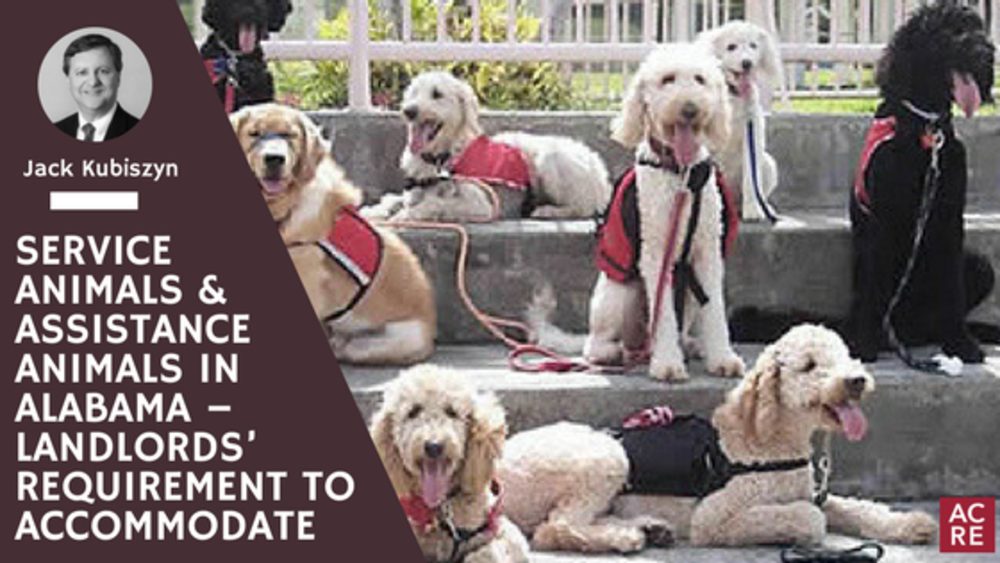Several airlines have made news recently tightening their rules for allowing both service and support animals on planes due to the misbehavior of the animals, along with abuses by individuals in claiming their pets (including turkeys, possums, snakes, and other animals) qualify for such accommodation in order to have them fly next to them on the plane at no cost.
Landlords in Alabama are facing similar situations in balancing their right to enforce a no-pets policy at their properties while at the same time allowing animals on site that provide support for those with disabilities. What questions can be asked? What documentation can be required? The answer is not the same for all animals, and currently there are inconsistencies in state law and federal law on what a landlord may request or require when a tenant requests an exception to a no-pets policy in place on rental property.
As a result of this dilemma, the Alabama Legislature recently passed legislation, which has already been signed into law by Governor Kay Ivey, that clarifies what qualifies as a “service animal” or an “assistance animal.” The legislation attempts to bring clarity to the rights of a tenant with a disability and the rights of a landlord so that a no-pets policy may be enforced at rental property while at the same time allowing people with true disabilities to have a service animal or an assistance animal at the property to assist them with their everyday lives.
Service and Assistance Animals in Alabama: The Regulatory History
Prior to this new legislation, the guidelines regulating service and assistance animals in Alabama were vague. In Alabama, those with disabilities were entitled to equal accommodations at apartments, and this right included the right to be accompanied by a service animal. At the time, Alabama law defined a service animal as a dog trained to do work or perform tasks for the benefit of an individual with a disability – so animals other than dogs did not qualify as service animals in this state. A landlord was not allowed to ask about an individual’s disability, request documentation of such disability, or request documentation that the dog in question has been trained or certified as a service animal. Rather, all a landlord was permitted to ask was limited to:
1. Is the dog a service animal required because of a disability? and
2. What work has the dog been trained to perform?
These questions were ONLY permitted if the dog’s services were not obvious. For example, even these questions would not be proper if a dog is guiding an individual who is blind. The Alabama law on service animals was consistent with federal law and the Americans with Disabilities Act of 1990 (the “ADA”), although the ADA does allow miniature horses that have been individually trained in certain circumstances.
In general, the definition of an assistance animal was much broader than the definition of a service animal in that it included animals other than dogs. Specifically, it included any animal that works, provides assistance, or performs tasks for the benefit of a person with a disability and included emotional support animals that provide a sense of safety, companionship, and comfort to those with disabilities.[1] Although prior to this new legislation Alabama law did not recognize the obligation for landlords to allow assistance animals on properties, the Federal Fair Housing Act (“FHA”) does require landlords to make reasonable accommodations for those with disabilities. This requirement includes allowing animals qualifying as assistance animals, including those providing emotional support, to live on the property in order to provide assistance to a disabled individual[2].
Because of the confusion between state law and federal law regarding the definition of service animals, assistance animals, and what may be requested by a landlord that has a no-pets policy, the Alabama Legislature passed new legislation – the Alabama Assistance and Service Integrity in Housing Act (the “Act”) – to clarify these issues. First, the Act expands the definition of a disability under Alabama law to include a physical or mental impairment that substantially limits one or more major life activities. The definition of a service animal is also expanded to include not only animals qualifying as service animals under the ADA, but also includes those animals in training to become service animals. The Act specifically addresses assistance animals and defines them as any animal qualifying as a reasonable accommodation under the FHA and includes emotional support animals.
The Act not only clarifies what constitutes service animals and assistance animals so as to be consistent with federal law, but it also sets out what may be requested by a landlord when a tenant requests an exception to the no-pets policy for an animal alleged to be an assistance animal. In this situation, a landlord may require that the tenant provide documentation from a medical provider that the assistance animal is needed for a specific disability (provided such disability is not readily apparent) and the need the assistance animal serves (if such disability-related need is not readily apparent to the landlord). The documentation that a landlord may request under the Act regarding assistance animals is consistent with the requirements under the FHA. The Act then goes on to provide penalties a person would face if they make materially false statements or provide materially false documentation that an animal qualifies either as a service animal or assistance animal.
The Act successfully passed both chambers of the Alabama Legislature and was recently signed into law by Governor Kay Ivey.
****************************************
[1] Emotional support animals are defined as animals providing a sense of safety and comfort for those with emotional disabilities or conditions, but that are not individually trained to perform specific tasks.
[2] Although landlords may be required to allow service animals or assistance animals on the property despite a no-pets policy, this obligation does not extend to animals acting in an unacceptable manner (i.e., barking, jumping on others or running away), if the animal behaves in such a manner as to pose a direct threat to the health and safety of others, or if the animal is not house broken.
About Christian & Small LLP
Christian & Small LLP represents a diverse clientele throughout Alabama, the Southeast and the nation with clients ranging from individuals and closely held businesses to Fortune 500 corporations. By matching highly experienced lawyers with specific client needs, Christian & Small develops innovative, effective and efficient solutions for clients. Christian & Small focuses on the areas of litigation and business and is a member of the International Society of Primerus Law Firms and the only Alabama member firm in the Leadership Council on Legal Diversity. Please visit www.csattorneys.com for more information, or contact Jack (jjkubiszyn@csattorneys.com) directly via email.





